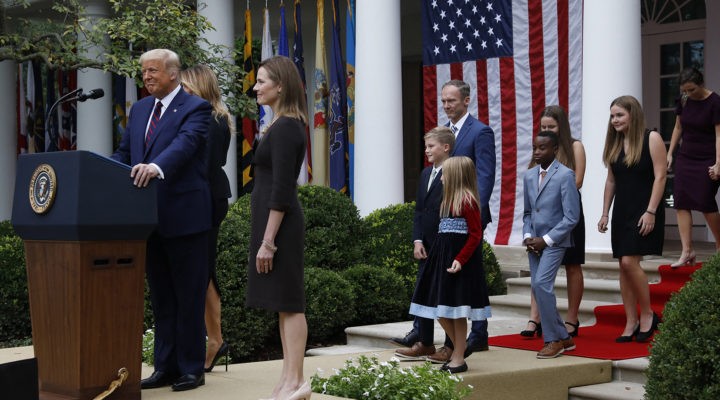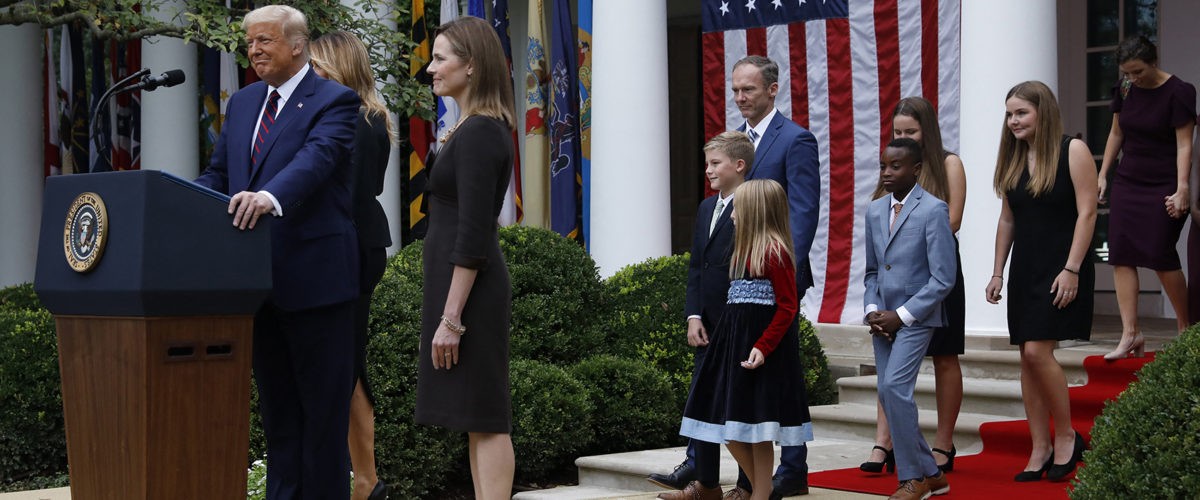For decades, political moderates and liberals have accused the Religious Right of advocating for a de facto religious test for office. With the upcoming confirmation hearings for Amy Coney Barrett’s nomination to the U.S. Supreme Court, the shoe may be on the other foot.
Already, critics of President Donald Trump’s rapid nomination of the conservative justice to fill the seat of Ruth Bader Ginsburg, who died just one week earlier, are homing in on her affiliation with a certain sect of Catholicism as a danger sign.
Is that faith identity fair game for questioning or not?
Strictly speaking, it is not fair game. Article VI of the Constitution states that “no religious test shall ever be required as a qualification to any office or public trust under the United States.”
That didn’t stop conservative Protestants in the South — most of whom were Democrats at the time — from initially opposing the candidacy of John F. Kennedy when he ran for president in 1960. Key Baptist figures were among those sounding alarms that a Catholic president would not respect the separation of church and state and would take orders from the Vatican.
The Constitution’s “no religious test” rule technically cannot be applied to a general election, even if it becomes a subtext to the election. But it does apply to any appointment to a government position that requires Congressional approval.
Republicans, Catholics and evangelicals
Because of the Republican Party’s deep ties to evangelical Christians and conservative Catholics especially since 1980, those two faith groups have come to dominate Republican elected officials and appointees. Pew Research reports that in the current Congress, “just two of the 252 GOP members do not identify as Christian” while “61 of the 282 Democrats do not identify as Christian.”
The makeup of Congress differs sharply from the makeup of the nation’s population, Pew adds. “Within Protestantism, certain groups are particularly numerous in the (current) Congress, including Methodists, Anglicans/Episcopalians, Presbyterians and Lutherans. Additionally, Protestants in the ‘unspecified/other’ category make up just 5% of the U.S. public, but 15% of Congress.”
“Identifying as a Christian or as a conservative Catholic is good politics for Republican candidates.”
In short, identifying as a Christian or as a conservative Catholic is good politics for Republican candidates.
This implied test for office would be hard to stop because it is the collective will of the voters. For those same Congresspersons to evaluate a Supreme Court nominee, however, is a different matter altogether.
The issue with Barrett is not just that she is a Catholic but that she is a particular kind of Catholic.
If confirmed to the court, Barrett would become the sixth justice who was raised Catholic to be named by Republican presidents. One of those, Neil Gorsuch, currently attends an Episcopal church with his family.
“This consistent tilt in Republican nominees for the high court is especially remarkable because Catholics represent a smaller share of the GOP’s electoral coalition than both mainline and especially evangelical Protestants,” reported Ronald Brownstein on CNN.
Brownstein’s report suggests two reasons for the Catholic tilt of Republican nominations to the high court: Supply and demand, and opposition to abortion. With views on abortion a litmus test for any Republican court nominee since 1973, devout Catholic justices come with both a training and an appearance of what’s wanted by conservatives. And the supply of Catholic-raised jurists who meet the qualifications for the court is greater than the supply of evangelical Christians with similar qualifications, Brownstein adds.
Questioning dogma
When Barrett faced Senate scrutiny in the fall 2017 for her appointment to a federal appeals court seat, Republicans accused Democrats of wrongly questioning the candidate’s religious beliefs.
“The dogma lives loudly within you,” Sen. Dianne Feinstein (D-Calif.) said in the hearing. Sen. Orrin Hatch (R-Utah) accused Feinstein of applying an unconstitutional “religious test” for office.
If that line of questioning emerges again, it will not be because Barrett is Catholic but because she is part of a tiny charismatic branch of Catholicism known as People of Praise. The group has been described as a cult by critics and as benign by supporters.
“The group teaches that husbands are the heads of their wives and should take authority over the family.”
“Some of the group’s practices would surprise many faithful Catholics,” the New York Times reported in 2017. “Members of the group swear a lifelong oath of loyalty, called a covenant, to one another, and are assigned and are accountable to a personal adviser, called a ‘head’ for men and a ‘handmaid’ for women. The group teaches that husbands are the heads of their wives and should take authority over the family.” (The term “handmaid” reportedly has been retired since the Times article was published.)
“Current and former members say that the heads and handmaids give direction on important decisions, including whom to date or marry, where to live, whether to take a job or buy a home, and how to raise children,” the Times report explained.
Those conditions are not substantially different from some ultra-conservative evangelical Christian churches, where members must submit themselves to “accountability” groups. However, such practice is not mainstream among either Protestants or Catholics.
On applying a religious test
Strict church-state separationists are among those drawing a line in the sand on how Barrett will be questioned.
“Senators should not take it upon themselves to characterize a nominee’s religious beliefs and practices. They also should not ask any question that might suggest that they would qualify or disqualify a nominee simply because of her faith, or lack thereof,” wrote Melissa Rogers in a Tweet the day of Barrett’s official nomination.
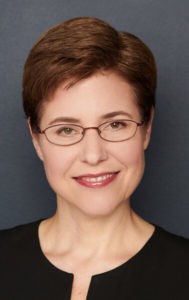
Melissa Rogers
Rogers is a lawyer and lifelong Baptist who served in the Obama White House. She is co-author of Religious Freedom and the Supreme Court and author of Faith in American Public Life. She previously worked for BJC, a Baptist religious liberty group based just steps from the Supreme Court building in Washington, D.C. She currently serves as visiting professor at Wake Forest University School of Divinity and as a nonresident senior fellow at the Brookings Institution.
Rogers recalled the 2017 Feinstein incident and noted: “That’s a troubling statement. It’s also dumb from a political standpoint.”
It would be appropriate for senators to ask Barrett about a law review article she co-authored on the intersection of religion and judicial ethics, Rogers suggested. And it’s “also fine” to ask any nominee whether he or she would be unable to support the Constitution for any reason, including any personal beliefs or affiliations.
“Of course, senators are always free to ask nominees about their views on any legal issue and to support or oppose them for such views,” she added. “I think senators should focus on the legal issues and the stakes for Americans’ daily lives.”
Amanda Tyler, executive director of BJC, agreed with Rogers.
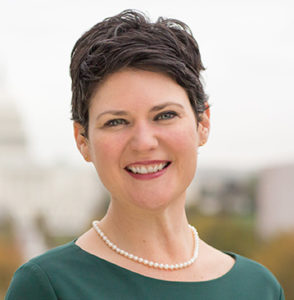
Amanda Tyler
“One of the core constitutional pillars upholding religious freedom for all is Article VI’s principle of ‘no religious test’ for public office,” Tyler said. “Someone’s religious identity — or lack thereof — is completely irrelevant to whether that person is qualified to hold an official position in our government.
“Judge Barrett’s religion should neither help nor hinder her in the confirmation process. While senators should refrain from asking about her religious views, they should uphold their duty to thoroughly vet her and question her about her constitutional and legal philosophy and positions to ensure that she would faithfully execute her duties as a justice.”
Writing recently in the Washington Post, columnist Hugh Hewitt, who is a law professor and conservative Catholic commentator, warned that Senate Democrats will pay a political price with voters if they press Barrett beyond the limits of the “no religious test” rule.
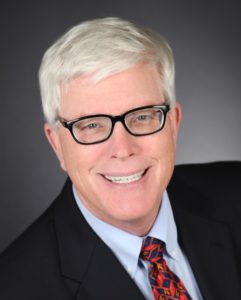
Hugh Hewitt
“If Senate Democrats in Barrett’s confirmation hearings, or in talking to the press, again focus on the nominee’s religion, the scurrilous tactic will almost certainly be met with disgust by voters,” he predicted. “Democrats up and down the ticket will not be protected from severe blowback just because they have previously nominated Catholics, Joe Biden among them, for the presidency. Today’s voters, Catholics in particular, will recognize any focus on faith in this judicial context for what it is: anti-Catholic bigotry.”
Even so, Hewitt acknowledged the sheer number of Catholics on the high court could create a problem of perception. “I and many other Catholics worry that a Supreme Court with a strong, long-term presence of self-identifying Catholics (there are currently five) could create the mistaken impression that the court’s decisions are driven more by theological concerns than legal ones. But that worry does not license the exercise of anti-Catholic bigotry against a particular nominee.”
On the other hand, Massimo Faggioli, professor of theology and religious studies at Villanova University, wrote in Politico that Barrett’s affiliation with People of Praise must be fair game for senators to inquire about.

Massimo Faggioli
“I’m a Catholic scholar, I’ve written two books on the type of religious community that Barrett is a member of, and I don’t think it’s anti-Catholic to ask questions about Barrett’s religious beliefs,” he wrote. “On the contrary, … I’m convinced they need to be front and center.
“In particular, the Senate Judiciary Committee should be prepared to ask to examine any covenant — a solemn contract binding before God — that she signed in the course of becoming a full member of People of Praise. Doing so will protect, not erode, America’s foundational value of religious liberty.”
Trying to understand the influence of People of Praise on the nominee “is not a matter of anti-Catholicism or even liberal bias against conservative Catholics,” he continued. “Barrett’s nomination would raise an important new problem: Is there a tension between forthrightly serving as one of the final interpreters of the Constitution and swearing an oath to an organization that lacks transparency and visible structures of authority that are accountable to their members, to the Roman Catholic Church and to the wider public?”
About the ‘no religious test’ rule
To understand the history of the “no religious test” rule, the National Constitution Center explains its context: “In England, religious tests were used to ‘establish’ the Church of England as an official national church. The Test Acts, in force from the 1660s until the 1820s, required all government officials to take an oath disclaiming the Catholic doctrine of transubstantiation and affirming the Church of England’s teachings about receiving the sacrament. These laws effectively excluded Catholics and members of dissenting Protestant sects from exercising political power. Religious tests were needed, William Blackstone explained, to protect the established church and the government ‘against perils from non-conformists of all denominations, infidels, turks, jews, heretics, papists, and sectaries.’”
The federal prohibition on a religious test for office did not mirror the practices of many of the 13 colonies that became states. Delaware’s constitution required government officials to “profess faith in God the Father, and in Jesus Christ His only Son, and in the Holy Ghost.” North Carolina disallowed from government service anyone “who shall deny the being of God or the truth of the Protestant religion.”
These state bans were not so much establishing a particular denomination as excluding Catholics and non-Christians.
Mark Wingfield is executive director and publisher of Baptist News Global.
Related articles:
This year’s tug of war over the Catholic vote and why it matters
Mormons and the 2020 presidential election: It’s complicated

